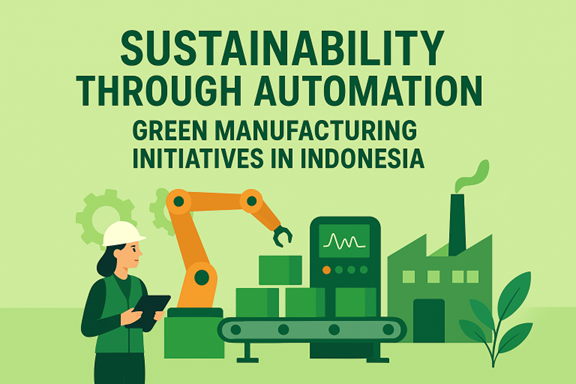Sustainability Through Automation: Green Manufacturing Initiatives in Indonesia

(Source: Generate by AI)
As sustainability becomes a global imperative, Indonesia’s industrial sector is undergoing a pivotal shift by integrating automation technologies with green practices. In 2025, industries across the archipelago are leveraging smart systems—such as IoT, robotics, and AI-driven control—to enhance energy efficiency, reduce waste, and promote eco-friendly manufacturing.
Automation Enabling Efficiency and Green Outcomes
Automation facilitates precise resource management through IoT sensors, robotics, and AI analytics, which help industries optimize energy use and minimize waste. For instance, smart energy control systems can dynamically adjust factory energy consumption, while automation reduces production variability and resource loss. Insights from the World Economic Forum’s Future of Jobs Report highlight that in Indonesia, 83% of firms anticipate digitalization—including automation—to transform their operations by 2030, compared to 60% globally.
Renewable Energy Integration Through Smart Systems
Indonesia is advancing its manufacturing sustainability by integrating renewable energy sources like solar, hydro, and bioenergy. Automated systems play a crucial role in harmonizing these sources with production demands. A case in point is Schneider Electric Indonesia’s smart factory in Cikarang, featuring EcoStruxure™ technology, rooftop solar panels, AI-driven automation, and digital Factory Acceptance Testing—signaling a strong commitment to clean energy-based production.
Circular Economy and Waste Minimization
Automation supports the transition to a circular economy. Technologies like digital twins and predictive maintenance prolong machine life and reduce material waste, while automated sorting in recycling facilities enhances material recovery. Indonesian events, such as the Indonesia Green Industry Summit (AIGIS) 2025, spotlight instruments like the Green Industry Service Company (GISCO) that help industries adopt low-carbon tech and improve energy efficiency—helping reduce waste and boost competitiveness.
Industry 4.0 Adoption and Smart Factory Examples
Several Indonesian manufacturers have embraced automation under the Making Indonesia 4.0 initiative. For example:
- Cargill’s cocoa plant in Gresik was awarded “Smart Factory INDI 4.0 2024” for its integration of real-time automation, energy management, and data monitoring in service of sustainable operations.
- Schneider Electric’s facility in Cikarang stands as a global smart factory model with advanced automation aligned with sustainability goals.
Market Trends and GrowaRTIth Outlook
Indonesia’s automation and control systems market is projected to grow from USD 119 million in 2025 to USD 180 million by 2030, at a CAGR of 8.6%. Moreover, the government’s “Creating Indonesia 4.0” roadmap encourages adoption of industrial sensors, robotics, and process control systems—positioning the country for stronger global competitiveness.
Opportunities and Challenges Ahead
Despite promising advancement, challenges persist—especially for SMEs. Only 17% of industrial SMEs have adopted any Industry 4.0 technologies compared to 70% of large manufacturers. Additionally, digital infrastructure remains uneven across regions, and automation system integration often involves costly infrastructure adjustments and customization. Overcoming these barriers will be key to scaling up sustainable automation nationwide.
References:
- World Economic Forum, Future of Jobs Report 2025 – Digitalization impact statistics
- ANTARA News (June 2025) – Schneider Electric smart factory and renewable energy integration
- INDI 4.0 Award to Cargill Gresik – Smart Factory recognition
- Indonesia Automation & Control System Market Report – Market size and growth
- Creating Indonesia 4.0 roadmap – Government automation strategy
- Industry 4.0 adoption rates and SME challenges – Digital infrastructure and scaling issues
- Indonesia’s machinery and NRE push – Renewable power plant development policy
- AIGIS 2025 and GISCO initiative – Circular economy and green financing




Comments :